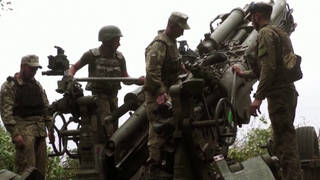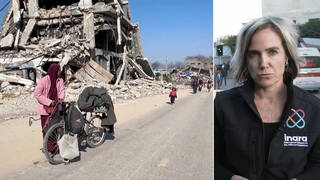
Related
As tensions grow between Russia and NATO over a potential invasion of Ukraine, up to 2 million people in eastern Ukraine are at risk of massive displacement and violence if the conflict escalates. We speak with the Norwegian Refugee Council’s Jan Egeland, who is on the ground in Ukraine and says a war could roll back nearly a decade of humanitarian progress made in the Ukrainian region. “We need reconciliation, we need peace,” says Egeland on the messages he is hearing from Ukrainians.
Transcript
AMY GOODMAN: This is Democracy Now! I’m Amy Goodman, with Nermeen Shaikh.
We go now from Moscow, Russia, to Kyiv, Ukraine, to look at the situation in eastern Ukraine and the humanitarian crisis unfolding there as some 2 million people face the threat of violence and displacement if the conflict escalates.
For more, in Kyiv, the capital of Ukraine, we go to speak with Jan Egeland, the secretary general of the Norwegian Refugee Council.
Jan, welcome back to Democracy Now! You were just in eastern Ukraine visiting the Donetsk and Luhansk regions and the contact line, where tensions are high. Can you describe what you saw?
JAN EGELAND: Well, I was there now for the last 72 hours, met with lots of completely exhausted, freezing, poor, miserable communities along the contact line. And their message, of course, to the world is: You know, enough of this political military chess game that everybody is obsessed with. We are suffering now. We’ve suffered for eight years with conflict. Our communities have been divided in Donetsk and in Luhansk. There is a frontline that has gone through families and communities now for eight years. We need — we need reconciliation. We need peace. Stop this escalation towards another catastrophe.
NERMEEN SHAIKH: And, Jan, as you’ve pointed out, it’s not just the risk of increasing numbers of refugees and IDPs as a result of the present situation. There are already 1.6 million internally displaced Ukrainians who have been forced to flee their homes in the midst of this ongoing war in Donbas.
JAN EGELAND: Indeed, there are hundreds and hundreds of thousands of people displaced. Some of them are working as my colleagues here in Ukraine. I have colleagues here who haven’t seen their parents for years, because all of the border crossings — not border crossing. These are crossings of the contact line, the frontline, which is within Ukraine and through Luhansk and Donetsk. There are seven crossing points. Six of them are basically shut. There is one where there are still people being able to cross on foot. It’s 90% down from what it was before the COVID, which became the excuse of especially the authorities in the nongovernment-controlled areas to keep people out.
Now, this suffering has been ongoing for too long, really. We were able to make progress in recent years. The numbers came down in the people still being displaced. We operate with a figure of 850,000. We were planning to do further progress. Now all of this risks to be erased in an instant. If there is war, there will be hundreds and hundreds of thousands of more people displaced. Two million people live within 20 kilometers of the frontline on either side.












Media Options